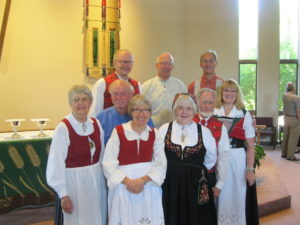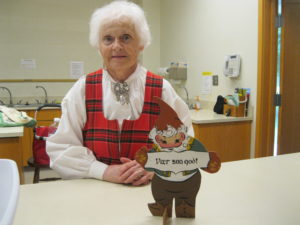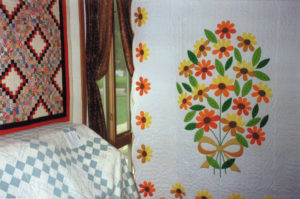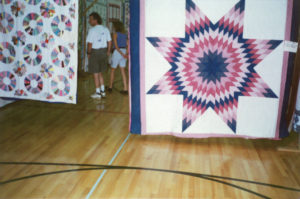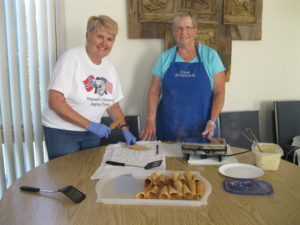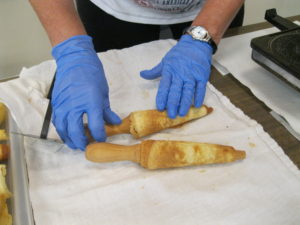The special Nordic Fest worship service held this morning featured music from Norwegian, Danish, Finnish, Swedish and Icelandic traditions. Some congregation members wore national costumes to help celebrate the Good Shepherd involvement with the 50th anniversary of Nordic Fest. The Fest, held annually during the last weekend in July, has been a significant tradition in the Decorah area community. Pr. R. David Berg, pastor at Good Shepherd from 1965-1974, was a guest this morning. 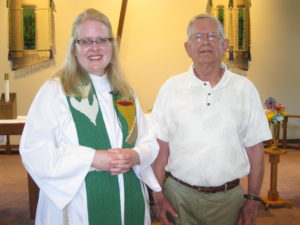 Krumkake was served during the fellowship hour after the service.
Krumkake was served during the fellowship hour after the service.
Nordic Fest Service, July 31
Good Shepherd Lutheran Church and Nordic Fest – “50 Years Strong”
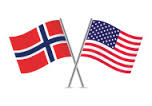 Introduction: In celebration of the 50th Anniversary of Nordic Fest in 2016, Elizabeth Kaschins and Kathy Buzza have researched and compiled highlights about the involvement of Good Shepherd in the Fest. They welcome additional information or corrections to this article. Some historic photos of Good Shepherd Nordic Fest activities are posted on the flickr site.
Introduction: In celebration of the 50th Anniversary of Nordic Fest in 2016, Elizabeth Kaschins and Kathy Buzza have researched and compiled highlights about the involvement of Good Shepherd in the Fest. They welcome additional information or corrections to this article. Some historic photos of Good Shepherd Nordic Fest activities are posted on the flickr site.
Good Shepherd Lutheran Church and Nordic Fest – “50 Years Strong”
Good Shepherd has been involved in Nordic Fest since it began in 1967- first with a Quilt Show and currently with its Krumkake Project. The Good Shepherd Band began performing at the Fest in the early1980s and has played at various locations every year since.
Several members of the congregation have served in Fest leadership positions: Two were among the Founders of the Fest, others have served on the Fest Board and its many committees. All will be honored as parade Grand Marshals this year.
The timeline below provides highlights of Good Shepherd’s involvement in Nordic Fest from 1967 to the present:
Quilt Show and Quilting Bee, Konditori, and Nordic Fest Sunday Worship
1967 – 1993*: At the Church, 701 Iowa Avenue
Quilt Show and Bee – Over 100 quilts from the Decorah area – pieced, appliqued, cross-stitched; old and new; utilitarian and decorative; small and large – were displayed in various ways on pews and quilt frames in Good Shepherd’s original sanctuary which became the Fellowship Hall in 1988. Labels and placards provided information about the owners and stories behind the creation and design of the quilts, some dating to the late 1800s. Quilting bees, involving women of the congregation, also were part of the shows. During this period, the show and bee expanded from one afternoon to each day of the Fest and attendance reached somewhat over 1000. There was no charge for admission.
Konditori – An area of the church was transformed into a pastry shop where visitors could relax and enjoy Sweet Soup, traditional Norwegian pastries, and coffee prepared and served by congregation members. The free-will offering received matching funds from Lutheran benevolent organizations and usually netted a profit of several hundred dollars annually.
Nordic Fest Sunday Worship – With the sanctuary filled with quilts from 1967-1987, worship services were held outdoors on the east side of the church. After our late Pastor Paul Hasvold arrived in 1974, he often wore a traditional black robe and white ruff, the liturgy and some hymns were sung in Norwegian, a family immigrant trunk and Hardanger cloth served as the altar, and sermon topics focused on Norwegian immigrants and Norwegian-American history.
*In 1988, the Quilt Show and Bee could not be held due to construction in progress on the addition to the church. To remain involved in the Fest, the congregation operated a food stand featuring Norwegian pastries at a downtown location.
1994 – 1999: Quilt Show Moved to the Decorah High School Practice Gym
Good Shepherd responded to the Nordic Fest Board’s request to bring the Quilt Show into the downtown area. A Nordic Fest Button now became required for admission. Attendance and earnings gradually diminished. The congregation also had a stand providing Norwegian pastries and beverages at various downtown locations during this period.
Krumkake Project
In 2000, Good Shepherd responded to the Nordic Fest Board’s request to take over demonstrating and selling Krumkake downtown. Krumkake, or bent cake, is a thin, rolled Norwegian cookie made from a batter of flour, butter, eggs, whipping cream, sugar, and sometimes selected spices using a decorative, two-sided, iron. Each year, congregation members gather at the church for several days just before the Fest to bake, roll, and package Krumkake.
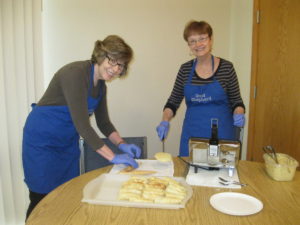
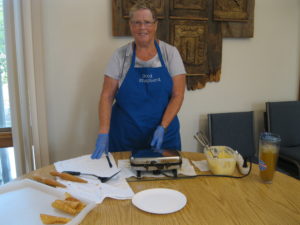
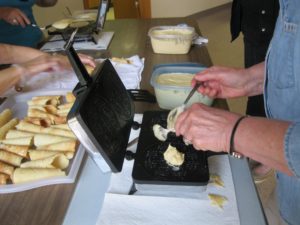 For Nordic Fest 2016 – Congregation members of all ages baked 4000 Krumkake for the church’s booth located on Water Street outside Bank of the West. This year for the first time, gluten-free Krumkake will be available. Packages of 3/$2.00 or 6/$4.00 are sold every day of the Fest. Demonstrations with samples will occur on Friday and Saturday in the lobby of Bank of the West.
For Nordic Fest 2016 – Congregation members of all ages baked 4000 Krumkake for the church’s booth located on Water Street outside Bank of the West. This year for the first time, gluten-free Krumkake will be available. Packages of 3/$2.00 or 6/$4.00 are sold every day of the Fest. Demonstrations with samples will occur on Friday and Saturday in the lobby of Bank of the West.
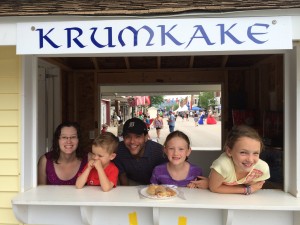 A majority of the proceeds from Good Shepherd’s Nordic Fest projects is distributed to community, national, and international non-profit organizations. A portion is devoted to identified congregation needs.
A majority of the proceeds from Good Shepherd’s Nordic Fest projects is distributed to community, national, and international non-profit organizations. A portion is devoted to identified congregation needs.
Good Shepherd Band
Under the initial leadership of Pastor Paul Hasvold, the Good Shepherd Band started performing at Nordic Fest in the early 1980s and has performed each year for the last 34 years. While the membership has changed over time, the band continues to perform a variety of crowd-pleasing old-time Scandinavian, Dixieland, and pop music, as well as old-time polkas, waltzes, and schottisches. The band has played in a variety of locations, including under canopies on Water Street and in front of the Court House, but also in the Viking Theater for a number of years. This year the band will play on Saturday after the parade, around 12:30 pm, at the Cattlemen’s Association booth located at Jefferson and River Streets.
Taking Our Worries to God – Sermon for July 17, 2016
Taking Our Worries to God – Sermon for July 17, 2017
NOTE: There is no audio at this time when guests preach.
9th Sunday After Pentecost
July 17, 2016
Good Shepherd Lutheran Church
Decorah, Iowa
Luke 10:38-42
Jane Jakoubek, Preaching
The holy Gospel according to Luke, the 10th chapter:
Now as they went on their way, he entered a certain village, where a woman named Martha welcomed him into her home. She had a sister named Mary, who sat at the Lord’s feet and listened to what he was saying. But Martha was distracted by her many tasks; so she came to him and asked, “Lord, do you not care that my sister has left me to do all the work by myself? Tell her then to help me.” But the Lord answered her, “Martha, Martha, you are worried and distracted by many things; there is need of only one thing. Mary has chosen the better part, which will not be taken away from her.
The Gospel of the Lord!
Like most people I know, I can’t get the images from the news reports out of my mind…Orlando, Dallas, Syria, France…the list goes on and on. The hatred, violence, and suffering leaves us reeling, off-balance, unnerved…and yes, frightened, worried, uncertain about what we could do that would make any difference. And these things come on top of the usual round of things that make daily life complicated and challenging—concerns about health, our loved ones, responsibilities we have at home or work or beyond.
In the midst of all this, our Gospel comes to us in a simple story. Jesus is visiting the home of his friend, Martha. Making her guest feel welcomed leaves Martha overwhelmed, distracted by the many tasks that are involved.
Many of us know how she felt. Haven’t we found ourselves overwhelmed by everything that is in front of us? Martha doesn’t suffer or fume in silence; she seeks help. She wants Jesus to notice; “Lord, do you not care that my sister has left me to do all the work by myself?” She wants Jesus to pay attention to her, to see everything that is piled on her, and to care about it. Then she gets directly to the point, “Tell [my sister] then to help me.” Many of us have lived out this scene in our own lives. Haven’t we found ourselves trying to get someone to pay attention to us and to come help us?
This is where Jesus comes into the story. Jesus doesn’t ignore her. Jesus doesn’t get angry. Jesus doesn’t judge her. No, Jesus calls her by name, “Martha, Martha!” Can’t you hear the deep compassion of his heart reaching out to the deep pain in her heart?
And then Jesus tells Martha what he sees; “you are worried and distracted by many things.” These may seem ordinary words until you contrast them with how Jesus names what he see in other situations: he condemns the scribes and Pharisees for standing and praying where others will see them or giving alms in a way that calls attention to themselves; he tells the woman at the well that she has had five husbands and the man she is with now is not her husband. The Gospels show us a Jesus who sees through to our very hearts and lives, who knows what we carry in our deepest, most secret places.
When Jesus responds to Martha first with her name, we hear him speaking to her with the voice of God’s compassion and deep love. And when he names the condition of her heart, he doesn’t call her a sinner or a hypocrite—he says “you are worried and distracted by many things.”
What’s wrong with being worried and distracted? After all, isn’t that a place that most of us find ourselves now and again, if not chronically? We have so many responsibilities; the daily news brings all the problems of our troubled world to our attention over and over. How can we NOT worry? And with so much going on, how can we NOT be distracted?
If Martha reminds us of ourselves and we too often find ourselves worried and distracted, then Jesus’ words are as much for us as for Martha. When Jesus points Martha away from worry and distractions, where does he point her? Jesus tells Martha, “there is need of only one thing.” One thing. One thing! Jesus is saying to focus on the one thing that we really need. How does Jesus tell Martha—and us—what that one thing is? He points to what Mary is doing…listening to him. She is focused on God’s message for her in this moment.
Notice that Jesus doesn’t tell Martha that preparing food, serving guests, and cleaning up are not important. After all, Jesus changed water into wine at a wedding feast and fed a crowd of 5000. Jesus teaches his followers that God knows we need food and clothing. What Jesus is trying to get Martha and all of us to understand is that when we focus on him—focus on God—then God will provide.
This is where prayer comes in. Prayer is the bridge between us with our worried and distracted lives and the God who created and loves us. Every time we find ourselves worried about something, we have a God who is ready to help us with it. Every worry is an invitation to pray:
Lord, keep my children safe as they travel this summer.
Lord, be with the families of the Dallas police officers.
Lord, be with the African-American community.
Lord, show me what I can do when I am around people who are filled with fear and hate.
Lord, give me the courage to speak up when I hear immigrants or gays or blacks put down.
God doesn’t care about the words we use or whether the prayer sounds like the prayers we read in church. God wants us to speak from the deepest places in our hearts about the things we care about most. It can be a quick sentence, “Lord, let me get home safely tonight,” or it can be a longer pouring out of the deepest ache of our heart, the kind of prayer where we talk to God the way we would talk to our most caring friend. Ask God to take the situation and care for it, bring healing, bring hope, bring peace. The Jesus who responded in love to Martha will respond in love to you.
And if we take our worries to God, we can do the same with those distractions. Lord, I am getting distracted right now by everything I have to do today. Help me to see your face in the midst of all the people I’m going to be encountering. Let me hear your voice leading me today. Lord, help me to focus on the work you want me to be doing right now to bring healing, compassion, your love and peace to this moment, these people, this situation.
Last Sunday, Pastor Amy showed how the story of the Good Samaritan speaks to us in the midst of racial hatred and violence. Today’s Gospel adds to that, showing us a God who is waiting for us to share the worries and distractions that weigh us down.
Let’s close with a prayer for the week ahead: Lord, you know are minds and hearts are weighed down by so many things. Help us to hear your invitation to bring them to you. Help us to bring them to you as easily as we would our closest friend. Help us to know you are listening. Help us listen to your voice leading us forward through everything that surrounds us. Thank you, Lord, for being with us this week. Amen.
Disoriented Guests – Sermon for July 3, 2016
7th Sunday after Pentecost
July 3, 2016
Rev. Amy Larson
Isaiah 66:10-14, Psalm 66:1-9, Galatians 6:7-16, Luke 10:1-11, 16-20
click here to read scripture texts for the day
Beloved of God, grace to you and peace in the name of Jesus.
When Jesus sent out seventy people to do his work in the world, he told them to be dependent on the kindness of others. He told them to show up as rather ill-prepared guests – guests who arrived without any bags and possibly really dirty feet because they weren’t even supposed to wear sandals? I can’t imagine anything more uncomfortable. I prefer to be really prepared for travel.
When I got the chance to travel to Norway for the wedding of some seminary friends, I prepared for months. I was going to do all the wedding festivities, visit distant family members and do a lot of hiking in the mountains. So I made all my lists and packed both dressier clothes and outdoor gear. Then four days before my flight, I slipped while bowling with friends and broke my wrist. I had to travel with a cast and I didn’t even have a good story to tell. If I’d been injured rock climbing or something cool that’d be one thing, but all I could say was, “injured while bowling.” I had to repack my backpack to make sure I could lift and maneuver it with one arm on the planes, trains and boats that would be part of the trip. A lot of the clothes and gear had to be left out. I decided I’d just have to do laundry a lot. Then on the plane ride over to Norway, my backpack was loaded below some stranger’s suitcase that had a bottle of wine in it. That bottle broke in flight and wine got all over my few remaining clothing items.
All my best laid plans seemed so remote when I showed up at the home of a distant cousin in Oslo with a cast on my arm, reeking of wine, needing to do laundry immediately. It was so uncomfortable to be such a dis-oriented guest. Even when we don’t show up smelling like wine, it can be hard to be a guest. Picture what it was, or is, like to go to with your parents to someone’s house for dinner as a kid. None of your toys are there; you can’t escape to your bedroom; there is strange, potentially gross food and not only do you have to eat it, you have to pretend to like it and say thank you. It’s what your parents say you have to do and even Jesus says in this Gospel reading, “eat whatever is set before you.”
The month I was in Norway was during the shrimp harvest. I love shrimp but there was a stretch there, when I was seeing different friends and family at each meal, during which I was served fresh shrimp and warm bread at each lunch and supper for five days in a row. That’s a lot of shrimp and bread, especially when you’re trying to peel shrimp and butter bread with one hand. It’s hard to be a guest. It’s hard to be dependent on the kindness of others. Yet that’s what Jesus asked of the seventy people he sent out to do his work in the world. He sent them to be totally dependent on others, to be served by others.
Why would Jesus tell them to go be welcomed and served by others? Aren’t Jesus’ followers supposed to be the ones who welcome and serve? There’s so much in scripture that encourages us to be welcoming – towelcome strangers, outcasts, children. A crucial task for each of us and for this congregation is to welcome – to let people know “there is a place for you here” and most importantly, there is a place for you in the heart of God. There is a place for you in God’s life. We all need to experience and share that welcome and the peace that comes from it.
But sometimes in order to really be able to experience and share God’s welcome, we need to be guests ourselves. That’s because when we’re acting as hosts and helpers we are in control. We get to pat ourselves on the back for how good and kind we are. As hosts, we also get to determine how much of the “house” the guests get to experience. We get to decide if they’re invited into the whole house or just the carefully prepared spaces for guests. We get to keep some doors closed, some areas off limits. Yet Jesus calls us to a hospitality that doesn’t keep others in safe and polite spaces, but allows others to shape and influence us – to rearrange the “furniture” of our lives, of our congregations.
We need this kind of rearranging to keep us from thinking that it is all about us and all up to us. When we think it’s all about us, we need people to disorient us a bit so that we can be reoriented towards God and others. When our lives are disrupted by others, we have the opportunity to discover that our hope and our home is in God, not in our own efforts. But most of us won’t let guests disrupt us much when we’re in the host role. So God sends us into places where we are guests, where we are outside our comfort zones, where we have to adapt and be changed, where we have to rely upon God.
It’s hard to be a disoriented guest, but sometimes it’s just what we need in order to experience and share the good news that we all have a place in God’s heart. When do you find yourself a disoriented guest: At the hospital with a health condition; at another congregation, or here, during worship or coffee hour; while visiting a loved one in a long term care facility; while traveling; while in the home of in-laws; while engaging with someone from another cultural background?
Pay attention to the times that you are in the role of guest and seek out those times. Those of us who participated in the My Neighbor is Muslim series really need to go to the Islamic Center in Rochester or Waterloo to be guests of our Muslim neighbors now that we’ve done the study. As a very white congregation, we need to go and be guests at African American congregations and seek out ways to be in partnership. We need to be disrupted, rearranged and opened to the hospitality of God at work in and for us. This will be uncomfortable, but we can also remember the images from the Isaiah reading we heard this morning.
Even as we have a God who knows we need disruptions, we also have a God who comforts us as a mother comforts her child.
The disruptions in our lives can turn us to the God who provides a nurturing home for us and all people, the God who holds out loving arms of welcome for all.
Let’s take a moment to rest in that welcome.
Amen.
Update from Catherine Moeller
From: catherine moeller <catherine.moeller@gmail.com>
Date: Sun, Mar 6, 2016 at 12:22 PM
Subject: Updates from Mexico!
To: Good Shepherd Congregation
Greetings all,



